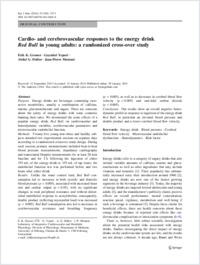Cardio- and cerebrovascular responses to the energy drink Red Bull in young adults: a randomized cross-over study
- Grasser, Erik Konrad Laboratory of Integrative Cardiovascular and Metabolic Physiology, Division of Physiology, Department of Medicine, University of Fribourg, Switzerland
- Yepuri, Gayathri Laboratory of Integrative Cardiovascular and Metabolic Physiology, Division of Physiology, Department of Medicine, University of Fribourg, Switzerland
- Dulloo, Abdul G. Laboratory of Integrative Cardiovascular and Metabolic Physiology, Division of Physiology, Department of Medicine, University of Fribourg, Switzerland
- Montani, Jean-Pierre Laboratory of Integrative Cardiovascular and Metabolic Physiology, Division of Physiology, Department of Medicine, University of Fribourg, Switzerland
-
29.01.2014
Published in:
- European Journal of Nutrition. - 2014, p. 1–11
Energy drink
Blood pressure
Cerebral blood flow velocity
Microvascular endothelial dysfunction
Hemodynamics
Risk factor
English
Purpose: Energy drinks are beverages containing vasoactive metabolites, usually a combination of caffeine, taurine, glucuronolactone and sugars. There are concerns about the safety of energy drinks with some countries banning their sales. We determined the acute effects of a popular energy drink, Red Bull, on cardiovascular and hemodynamic variables, cerebrovascular parameters and microvascular endothelial function.Methods: Twenty-five young non-obese and healthy subjects attended two experimental sessions on separate days according to a randomized crossover study design. During each session, primary measurements included beat-to-beat blood pressure measurements, impedance cardiography and transcranial Doppler measurements for at least 20 min baseline and for 2 h following the ingestion of either 355 mL of the energy drink or 355 mL of tap water; the endothelial function test was performed before and two hours after either drink.Results: Unlike the water control load, Red Bull consumption led to increases in both systolic and diastolic blood pressure (p < 0.005), associated with increased heart rate and cardiac output (p < 0.05), with no significant changes in total peripheral resistance and without diminished endothelial response to acetylcholine; consequently, double product (reflecting myocardial load) was increased (p < 0.005). Red Bull consumption also led to increases in cerebrovascular resistance and breathing frequency (p < 0.005), as well as to decreases in cerebral blood flow velocity (p < 0.005) and end-tidal carbon dioxide (p < 0.005).Conclusion: Our results show an overall negative hemodynamic profile in response to ingestion of the energy drink Red Bull, in particular an elevated blood pressure and double product and a lower cerebral blood flow velocity.
- Faculty
- Faculté des sciences et de médecine
- Department
- Médecine 3ème année, Département de Médecine
- Language
-
- English
- Classification
- Dietetics, nutrition
- License
-
License undefined
- Identifiers
-
- RERO DOC 210105
- DOI 10.1007/s00394-014-0661-8
- Persistent URL
- https://folia.unifr.ch/unifr/documents/303704
Statistics
Document views: 168
File downloads:
- Fichier principal: 187
